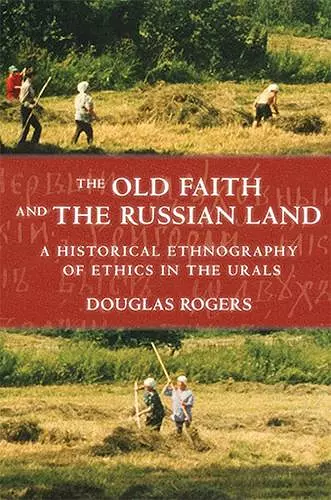The Old Faith and the Russian Land
A Historical Ethnography of Ethics in the Urals
Format:Paperback
Publisher:Cornell University Press
Published:22nd Oct '09
Currently unavailable, and unfortunately no date known when it will be back
This paperback is available in another edition too:
- Hardback£120.00was £120.00(9780801447976)

The Old Faith and the Russian Land is a historical ethnography that charts the ebbs and flows of ethical practice in a small Russian town over three centuries. The town of Sepych was settled in the late seventeenth century by religious dissenters who fled to the forests of the Urals to escape a world they believed to be in the clutches of the Antichrist. Factions of Old Believers, as these dissenters later came to be known, have maintained a presence in the town ever since. The townspeople of Sepych have also been serfs, free peasants, collective farmers, and, now, shareholders in a post-Soviet cooperative. Douglas Rogers traces connections between the town and some of the major transformations of Russian history, showing how townspeople have responded to a long series of attempts to change them and their communities: tsarist-era efforts to regulate family life and stamp out Old Belief on the Stroganov estates, Soviet collectivization drives and antireligious campaigns, and the marketization, religious revival, and ongoing political transformations of post-Soviet times.
Drawing on long-term ethnographic fieldwork and extensive archival and manuscript sources, Rogers argues that religious, political, and economic practice are overlapping arenas in which the people of Sepych have striven to be ethical—in relation to labor and money, food and drink, prayers and rituals, religious books and manuscripts, and the surrounding material landscape. He tracks the ways in which ethical sensibilities—about work and prayer, hierarchy and inequality, gender and generation—have shifted and recombined over time. Rogers concludes that certain expectations about how to be an ethical person have continued to orient townspeople in Sepych over the course of nearly three centuries for specific, identifiable, and often unexpected reasons. Throughout, he demonstrates what a historical and ethnographic study of ethics might look like and uses this approach to ask new questions of Russian, Soviet, and post-Soviet history.
Rogers's narrative includes useful connections of his discussion to larger problems of scholarship on Old Believers and the anthropology of Russia more generally. His prose is engaging, accessible, and a pleasure to read, so the book should be appropriate for a wide range of undergraduate teaching as well as more specialized audiences.
- Alexander King (Journal of the Royal Anthropological Institute)This is a beautiful book that asks large questions of multiple sources on one small community. It deserves a readership far beyond scholars of Russia or socialism.
- Sonja Luehrmann (Journal of Anthropological Research)Douglas Rogers has written a pathbreaking work of historical anthropology that should become standard reading for historians and other social scientists. Sensitive to religious and economic contexts, he charts the history of the town of Sepych in the western Perm region over the longue durée, beginning with the creation of the priestless Old Believer settlement in the late seventeenth century and ending in the post-Soviet era. Without ignoring the peculiar circumstances that serfdom and ownership by the Stroganov family imposed on the community, Rogers analyzes three major turning points brought about by shifting economic relationships and, in two cases, political change: capitalist modernization after emancipation, which created a schism in the Old Believer community; the imposition of socialism and central planning in the Soviet era; and finally the introduction of global capitalism upon the Soviet Union's demise.... In its goal of moving beyond generalizations about peasant societies as tradition bound, backward, collective, isolated, and centers of resistance, the monograph succeeds brilliantly.
(Christine Woro- Winner of Honorable Mention, Clifford Geertz Prize in the An.
ISBN: 9780801475207
Dimensions: 235mm x 155mm x 21mm
Weight: 907g
360 pages